|
|
|
Sort Order |
|
|
|
Items / Page
|
|
|
|
|
|
|
| Srl | Item |
| 1 |
ID:
080367


|
|
|
|
|
| Publication |
2007.
|
| Summary/Abstract |
Terrorism is a pivotal matter in Turkish politics. In this article, a specific terrorist activity, which is still having an impact upon Turkish politics, has been analyzed. It scrutinizes two perspectives of the event. Some actors lean towards a secular/positivist reading of events while others favour a conservative/postmodern reading. This serious factional political debate is possibly just the result that the terrorists had in mind. Being imbued by republican principles, the seculars' claims compel the conservatives to raise defensive points since they are blamed for murdering secular figures and targeting the very essence of the republic. Using different symbolic readings, both sides arrive at opposing conclusions: for the seculars the aim/message of the terror is clear - it is the republic; for the conservatives the aim/message is hidden - destabilizing the country
|
|
|
|
|
|
|
|
|
|
|
|
|
|
|
|
| 2 |
ID:
080364


|
|
|
|
|
| Publication |
2007.
|
| Summary/Abstract |
This article attempts to measure the direct costs that the terrorist attacks of 3/11 had on the economy of the region of Madrid. The evaluation has been made applying conservative criteria, and the results obtained have to be considered as minimum. The result indicates that the terrorist attacks caused a loss of nearly 212 million euros to the regional economy of Madrid, equivalent to 0.16 percent of the regional GDP (0.03 of the national GDP). This confirms that the immediate economic dimension of a terrorist attack such as the one of 3/11 - apart from human catastrophic consequences - is relatively low.
|
|
|
|
|
|
|
|
|
|
|
|
|
|
|
|
| 3 |
ID:
080369
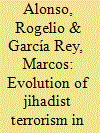

|
|
|
|
|
| Publication |
2007.
|
| Summary/Abstract |
Over the last few years, Moroccans have been disproportionately involved in jihadist terrorism. Morocco has been increasingly identified as one of the largest producers of terrorists and insurgents in Afghanistan, Iraq, and throughout Europe. This article examines the factors behind the emergence of jihadist terrorism in Morocco, and how this terrorist threat has gone beyond this country's borders. Three factors have contributed to this development: the influence of global jihad on potential Moroccan jihadists; the growing Islamization of the country; and deteriorating socioeconomic conditions. In analyzing these variables, special attention will be paid to the Casablanca terrorist attacks on May 16, 2003, marking the debut of suicide terrorism in Morocco. The article will also examine the principal counterterrorist initiatives Morocco has implemented in response to this threat.
|
|
|
|
|
|
|
|
|
|
|
|
|
|
|
|
| 4 |
ID:
080368
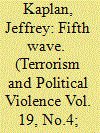

|
|
|
|
|
| Publication |
2007.
|
| Summary/Abstract |
This article builds on David Rapoport's Four Waves Theory by identifying several anomalous movements which did not appear to precisely fit with the internationalist model posited in Rapoport's Four Waves. Specifically, groups which I have called Fifth Wave movements have turned inward, becoming localistic rather than international, and manifest intense ethnic, racial, or tribal mysticism. They are millenarian and chiliastic in nature, and seek to create a new society - based on the creation of new men and women - in a single generation. Fifth Wave movements thus focus strongly on women and see children as the vanguard of their movements. Following this logic, rape is their signature tactic and child abduction their normal recruiting practice. This study posits the pre-state Khmer Rouge in Cambodia as the avatar of the current Fifth Wave, but finds that after a nearly generation-long hiatus, the fifth wave in its fully modern form emerged in Africa with the Lord's Resistance Army in Uganda as its paradigmatic exemplar
|
|
|
|
|
|
|
|
|
|
|
|
|
|
|
|
| 5 |
ID:
080363


|
|
|
|
|
| Publication |
2007.
|
| Summary/Abstract |
The maintenance of a "moderate mainstream" Muslim community as a bulwark against the fraying of harmonious ethnic relations has become a key governance concern post-September 11. In light of the global concern - and often paranoia - with diasporic Islam, Islamic religious institutions and civil society have been portrayed in the popular media as hotbeds of radicalism, promoters of hatred, and recruiters for a "conflict of civilization" between the Muslim world and the modern world. Having declared itself a terrorist's "iconic target," Singapore has taken a broad-based community approach in advancing inter-religious tolerance, including a subtle initiative to include the "Muslim civil society" in advancing the understanding and the promotion of a moderate brand of Islam in Singapore. This tacit process of regulation (top-down, intra-community and inter-community), while effective, is constrained by the unique governance context in Singapore
|
|
|
|
|
|
|
|
|
|
|
|
|
|
|
|
| 6 |
ID:
080366
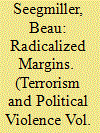

|
|
|
|
|
| Publication |
2007.
|
| Summary/Abstract |
In recent years we have witnessed a growing body of scholarship that asserts that religion often motivates violence; anti-abortion violence is presented as a prominent example. Through examining the rhetoric and actions of anti-abortion bomber Eric Rudolph, I question the centrality of religion when invocations of divine authority or apocalyptic narratives are conspicuously absent in his justificatory writings. I argue that other social, political, and strategic considerations are more significant in the emergence of a radicalized anti-abortion movement than religion. This analysis nuances notions of a causal relationship between religion and violence and calls for interrogation of the category
|
|
|
|
|
|
|
|
|
|
|
|
|
|
|
|
| 7 |
ID:
080370
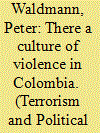

|
|
|
|
|
| Publication |
2007.
|
| Summary/Abstract |
This study identifies evidence of a "culture of violence" in Colombia and discusses the structural conditions that allow or cause such a culture to arise. The thesis is that economic factors alone cannot explain violence; rather, cultural factors must be taken into account
|
|
|
|
|
|
|
|
|
|
|
|
|
|
|
|
| 8 |
ID:
080365
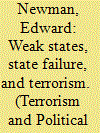

|
|
|
|
|
| Publication |
2007.
|
| Summary/Abstract |
It is common to hear the assertion that weak or failed states are fertile ground for terrorism. Yet terrorist groups have emerged from, and operated within, countries which have strong, stable states and a variety of systems of government. Terrorist organizations operate in weak and failed states but it is not necessarily the condition of weak or failed statehood which explains their presence. Moreover, it is not necessarily the weakest states which do host such groups. Therefore, this condition is not a sufficient explanation for their presence. While weak or failed states might provide an enabling environment for certain types of terrorist groups to operate, additional explanatory variables need to be identified
|
|
|
|
|
|
|
|
|
|
|
|
|
|
|
|
|
|
|
|
|